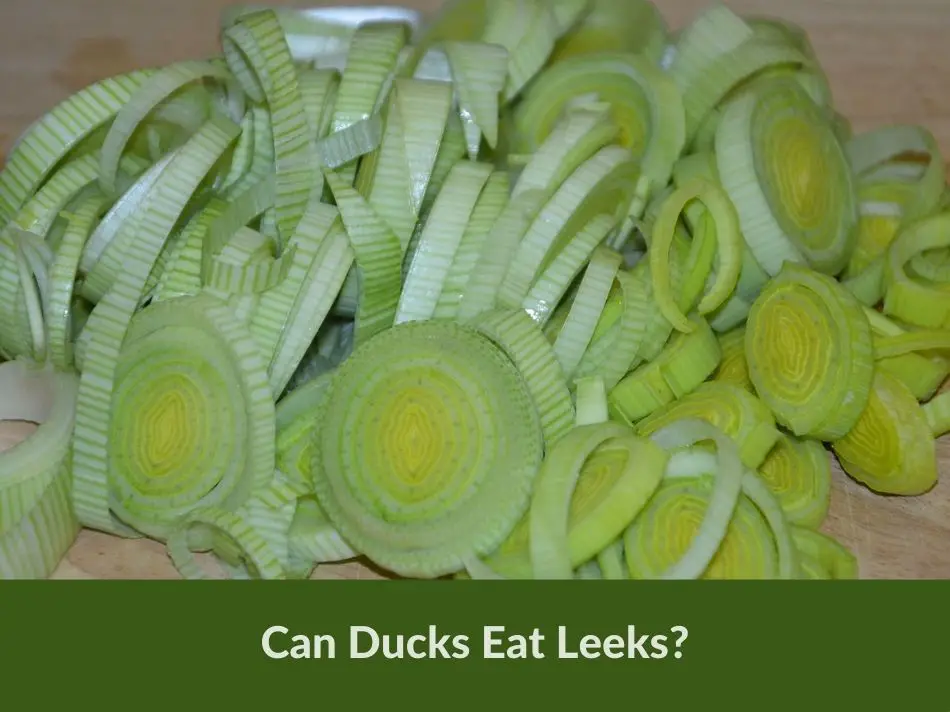Ducks, just like many other animals, have specific dietary needs and restrictions. When feeding ducks, it is essential to provide them with a balanced diet to ensure their overall well-being. But, can ducks eat leeks?
No, ducks should not eat leeks because they contain thiosulfate, which is toxic to ducks. If consumed in high amounts can cause hemolytic anemia.
In this article, readers will learn about the risks of feeding ducks leeks, primarily due to thiosulfate. We’ll explore thiosulfate’s effects, related symptoms, and the importance of a species-specific diet for ducks.
What is Thiosulfate?
Thiosulfate is a naturally occurring compound found in a variety of plants, especially in the Allium family, which includes leeks, onions, garlic, and chives. In certain quantities, thiosulfate can be harmful or even toxic to some animals.
Thiosulfate and Hemolytic Anemia
One of the primary concerns associated with thiosulfate ingestion in ducks and other animals is the risk of oxidative damage to their red blood cells. This damage can lead to a condition called hemolytic anemia.
Hemolytic anemia occurs when red blood cells are destroyed faster than they can be produced. Thiosulfate can cause oxidative damage to the red blood cells of ducks, making them more fragile and susceptible to breaking apart. This leads to a decrease in the number of healthy circulating red blood cells, which are crucial for transporting oxygen throughout the body.
Symptoms of Thiosulfate Poisoning
Ducks that have consumed a toxic amount of thiosulfate-containing plants, like leeks, may exhibit several symptoms:
- Lethargy or weakness
- Rapid or labored breathing
- Pale or bluish mucous membranes
- Dark-colored urine due to the presence of hemoglobin
- Loss of appetite
Differences in Animal Digestion
While humans consume leeks and other Allium vegetables regularly with no adverse effects, ducks and many other animals process these compounds differently. Their digestive systems might not break down or eliminate thiosulfate as efficiently as ours, leading to a buildup of the compound in their system and the subsequent health issues.
Prevention is Key
The best way to protect ducks from the adverse effects of thiosulfate is to ensure that they do not have access to plants that contain this compound. It’s always a good idea for duck owners and caretakers to be aware of all the foods and plants their ducks are consuming. Being educated and vigilant about the potential hazards can make a significant difference in the overall health and well-being of the ducks.
Leeks Nutritional Value
Below is the nutritional value of 100 grams of leeks.
- Calories: 61
- Protein: 1.5 grams
- Carbohydrates: 14 grams
- Fiber: 1.8 grams
It also contains several vitamins and minerals as listed below.
- Vitamin K
- Manganese
- Copper
- Folate
- Iron
- Vitamin C
- Vitamin B6
Other Vegetables Ducks Can Eat
Ducks can enjoy a variety of vegetables as part of their balanced diet. These vegetables provide essential nutrients and are typically well-tolerated by our feathered friends. If you’re considering expanding your ducks’ diet, here are some more vegetables they can safely consume:
Conclusion
While leeks and other Allium vegetables offer various health benefits for humans, they are not suitable for ducks due to the thiosulfate they contain. Feeding ducks a diet tailored to their specific needs and avoiding potentially harmful foods like leeks will ensure they live healthy, happy lives.
As with any pet or farm animal, when in doubt about dietary concerns, always consult with a veterinarian or avian specialist.
Disclaimer: The information in this article is for informational purposes only. I'm not an expert or a veterinarian.


